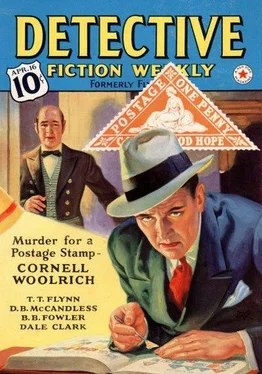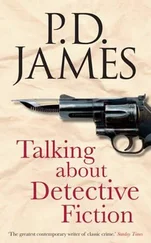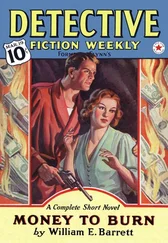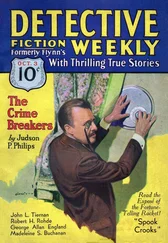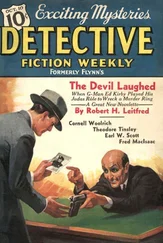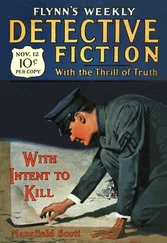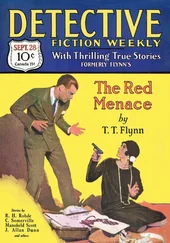Лоуренс Трит - Detective Fiction Weekly. Vol. 118, No. 6, April 16, 1938
Здесь есть возможность читать онлайн «Лоуренс Трит - Detective Fiction Weekly. Vol. 118, No. 6, April 16, 1938» весь текст электронной книги совершенно бесплатно (целиком полную версию без сокращений). В некоторых случаях можно слушать аудио, скачать через торрент в формате fb2 и присутствует краткое содержание. Город: New York, Год выпуска: 1938, Издательство: The Red Star News Company, Жанр: Детектив, на английском языке. Описание произведения, (предисловие) а так же отзывы посетителей доступны на портале библиотеки ЛибКат.
- Название:Detective Fiction Weekly. Vol. 118, No. 6, April 16, 1938
- Автор:
- Издательство:The Red Star News Company
- Жанр:
- Год:1938
- Город:New York
- ISBN:нет данных
- Рейтинг книги:3 / 5. Голосов: 1
-
Избранное:Добавить в избранное
- Отзывы:
-
Ваша оценка:
- 60
- 1
- 2
- 3
- 4
- 5
Detective Fiction Weekly. Vol. 118, No. 6, April 16, 1938: краткое содержание, описание и аннотация
Предлагаем к чтению аннотацию, описание, краткое содержание или предисловие (зависит от того, что написал сам автор книги «Detective Fiction Weekly. Vol. 118, No. 6, April 16, 1938»). Если вы не нашли необходимую информацию о книге — напишите в комментариях, мы постараемся отыскать её.
Detective Fiction Weekly. Vol. 118, No. 6, April 16, 1938 — читать онлайн бесплатно полную книгу (весь текст) целиком
Ниже представлен текст книги, разбитый по страницам. Система сохранения места последней прочитанной страницы, позволяет с удобством читать онлайн бесплатно книгу «Detective Fiction Weekly. Vol. 118, No. 6, April 16, 1938», без необходимости каждый раз заново искать на чём Вы остановились. Поставьте закладку, и сможете в любой момент перейти на страницу, на которой закончили чтение.
Интервал:
Закладка:
“Wait,” said John Harne. “Callum wasn’t killed until after Kendall had left the house. How could Lois know the papers hadn’t gone with him?”
Stan shrugged.
“She came downstairs a second time, to let the blond man into the house. From the stairway, she could look into her uncle’s study. The papers may have been in plain sight there,” he argued. “Besides, Kendall wouldn’t carry ten grand in his pockets. And Callum wouldn’t want to take a check, under such circumstances. It would be logical for Lois to expect Kendall to come back later — or the next day — with the money.”
Selma’s brown eyes flashed. “Stan Baxter, you don’t really believe all of that.”
“No. No, I don’t.”
“Then why say such things about Lois?”
“Because the D.A. will think these things,” Stan said grimly. “It all goes to supply Lois with a motive. An urgent motive for murdering Callum that night. It ties up with the nitrate stains on her hand and the bullet torn oil-cloth.”
Selma exclaimed, “But she explained those things!”
Stan shook his head.
“Let’s take the legal view of it,” he said. “Suppose she did practice with the gun. Suppose she did accidentally put a bullet hole into the garage. She could have done all those things and still killed Callum. ”
He smashed his fist into his palm. “It’s even worse than that. The bullet hole in the garage can be twisted to show premeditation. They’ll say she put that bullet hole there on purpose, so that later on she could explain away the oil-cloth.”
Selma stared at the young lawyer in stupefied silence. She gnawed her underlip nervously.
“Then,” said John Harne. “Lois is in more danger than ever?”
Stan nodded. “She’s in the greatest possible danger. No attorney could persuade a jury that she didn’t kill her uncle. Not on the facts we now have.”
“But what about the Randt killing?” Selma cried. “You mean the same killer murdered both, and she was in jail when Randt was shot.”
“Yes, I believe that,” Stan said gently. “But I couldn’t tell it to the jury. Couldn’t even get the facts before them. Any testimony about Randt’s death would be ruled out of court.”
“Incompetent, irrelevant, and immaterial?” asked Harne.
“Exactly.”
Selma wrung her hands. The diamond flashed in the firelight. “But we’ve got to do something! In spite of all you say, Lois is innocent. We can’t let her go to... to the chair!”
“There’s only one thing we can do,” said Stan. “We’ve got to catch the real murderer.”
There was a little silence, broken only by the ticking of a clock and the snapping of the eucalyptus fire. The three ex changed nervous glances.
Harne spoke first, clearing his throat. “What about Frank Kendall? If he wanted those documents badly enough — if it was cheaper to kill Callum rather than pay ten thousand dollars—?”
“I don’t think so,” said Stan. “Kendall would not have shot Callum at the door. He would have gone into the study. He would have forced his victim to open the safe. He didn’t know that Lois hadn’t the combination to the safe.”
Harne growied. “But if he was on the grounds when Mr. Randt was shot—?”
“No,” said Stan. “That won’t do, either. The man I trailed across the yard never got to the porch — never even crossed the terrace. He wasn’t that far ahead of me.”
“But you chased him, didn’t you?” said Harne. “And I saw him running down the driveway.”
“You saw him — not the killer.”
“But how—”
Stan said, “The murderer was still on the porch when you saw Kendall running across the yard.”
John Harne gulped. “I didn’t look down the porch at all! He could have been crouching there among the elephant ears — then he could have darted across the yard the other way. He could even have fled back into the house.”
There was another startled silence. Stan broke it this time.
“I’ve got to see the judge,” he said. “I’m going to the plant.”
Chapter XII
The Blond Man
The steel gate in front of the Randt Camera Company building was locked. On the gatepost appeared a panel into which was set a button, and the sign, Night Bell. Stan Baxter rang and waited.
He got no response.
His stare went up to the office wing of the building. A yellow panel in the night was a window, with shade drawn. As if thrown on a magic lantern screen, a shadow appeared against the shade. Stan recognized the bulky silhouette. It was Judge Horace Elmore.
The judge was putting on a topcoat and a hat. The light went out, and the whole building stood shrouded in darkness.
After this, nothing at all happened.
It was very odd, thought Stan Baxter. Odd that it should have taken Elmore this long merely to return some papers to the office. That the watchman had not answered the night bell. And most curious that Horace Elmore, several minutes after snapping off the office light, had not emerged from the building.
Stan stepped back and peered up at the riot fence which surrounded the plant. The fence, a very strong one, was at least twelve feet high; then it was furnished with a setback of barbed wire. A similar setback protected the top of the steel gate. Even a man with a ladder would have had a sorry time scaling this fence. To tackle the thing barehanded was out of the question.
Stan Baxter started. He had heard a groan. The sound was muffled, but certainly it had originated in a human throat.
Then a light flickered briefly inside the building. It was at the lower end of the plant, and Stan saw it only because the groan had seemed to come from that direction.
He took two long steps to his coupé, which was parked in the driveway fronting the gate. He snapped his flashlight from its clips along the steering column. He ran up the street.
On the afternoon which preceded Joseph Callum’s death, Stan had observed a street improvement project here. A sewer main was being placed. At that time he had scarcely noted the work. Mainly he had been watching Selma and John Harne drive away in Harne’s roadster. The steam shovel had been an unimportant factor, but it was all-important now.
During the day, some fifty yards had been added to the trench beside the riot fence. Stan covered that fifty yards at top speed. He leaped into the cab, came out onto the rusted arm of the machine.
It was a steep climb. Stan made sure that his flashlight and Elmore’s .38 were snugly stowed in his coat pockets before attempting it. He made the climb on all-fours.
The thing had looked very simple from the ground. Twenty feet up in the night, with a brisk cold wind whipping into his face, it became a good deal more of a feat Stan balanced precariously erect on the narrow slant of the yard arm. Directly below him was the big metal bucket. Also below him, but several yards away, the fence stretched its wickedly barbed top.
His knees bent in to a jumper’s crouch.
Sole leather whisked a sound into the night. There was another, explosive sound. “Huh-h!”
And then. “Oh, hell!”
Stan was still on the shovel’s arm, sprawled there with his arms hanging over one side of it and his legs on the other. He had been extremely lucky. He had slipped before actually jumping, and he had instinctively thrown himself across the arm instead of plunging down onto the biting edges of the dirt bucket.
The damage was slight — a little wind knocked out.
Stan pulled himself to his feet. It took nerve to do this, and more nerve to stare out over the fence where the steel barbs glimmered their menace.
A little shiver ran up his spine, and he wet his lips nervously. He was not a fool. And even a fool would have been impressed by the possibilities of that barbed wire setback. A man who landed in that hell’s thicket would lose a good deal of blood before he got out.
Читать дальшеИнтервал:
Закладка:
Похожие книги на «Detective Fiction Weekly. Vol. 118, No. 6, April 16, 1938»
Представляем Вашему вниманию похожие книги на «Detective Fiction Weekly. Vol. 118, No. 6, April 16, 1938» списком для выбора. Мы отобрали схожую по названию и смыслу литературу в надежде предоставить читателям больше вариантов отыскать новые, интересные, ещё непрочитанные произведения.
Обсуждение, отзывы о книге «Detective Fiction Weekly. Vol. 118, No. 6, April 16, 1938» и просто собственные мнения читателей. Оставьте ваши комментарии, напишите, что Вы думаете о произведении, его смысле или главных героях. Укажите что конкретно понравилось, а что нет, и почему Вы так считаете.
